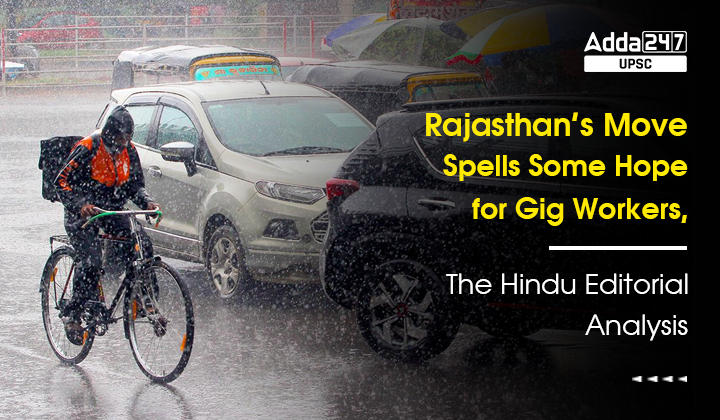Table of Contents
The Hindu Editorial Analysis: The Editorial Analysis of The Hindu Newspaper Editorial Articles aimed at simplifying various concepts relevant to the UPSC and other State PSC Exams. The Editorial Analysis helps in expanding the knowledge base as well as framing better quality mains answers. Today’s Hindu Editorial Analysis of ‘Rajasthan’s Move Spells Some Hope for Gig Workers’ discusses various facets of gig worker’s problems and challenges especially in the backdrop Rajasthan government’s initiative to protect gig workers in the state.
Rajasthan Platform-Based Gig Workers Social Security and Welfare Fund in News
Recently, the Chief Minister of Rajasthan made an announcement regarding the establishment of India’s inaugural welfare fund, known as the Rajasthan Platform-Based Gig Workers Social Security and Welfare Fund.
- This development marks a significant regulatory step in addressing the vulnerabilities faced by gig and platform workers, following the passing of the Code on Social Security in 2020.
- The implementation of this fund is particularly noteworthy as it recognizes the pivotal role played by platform workers during the COVID-19 pandemic, where they served as a crucial support system for metropolitan logistics, working alongside state governments in food relief initiatives and catering to customer needs.
Lack of Initiatives for Gig Workers by Other States
As of 2023, numerous state governments have not yet established rules outlining the implementation of the Code on Social Security.
- This delay has raised concerns regarding the timely provision of benefits for gig and platform workers who, despite being classified as “independent contractors,” are required to adhere to regulations that resemble an employer-employee relationship.
- However, Rajasthan stands out as a proactive state, taking swift action in this regard, possibly due to the upcoming Assembly elections next year.
- Their proactive approach highlights their commitment to addressing the needs of gig and platform workers.
Rajasthan Platform-based Gig Workers Welfare Board
Throughout the post-Independence era, specific industries such as construction workers, dock workers, and head loaders (mathadi) have established welfare boards to cater to their well-being. With the introduction of the Rajasthan Platform-based Gig Workers Welfare Board, a similar institution will now be available to address the needs of the technology-mediated workforce.
- This board operates as a tripartite body, comprising representatives from the bureaucracy, employers or clients, and workers’ unions or associations.
- It serves as an alternative approach to the traditional formal employment structure, which relies on employment contracts and contributory worker benefits to facilitate communication and address issues promptly between workers, employers, and the state.
Need for Tripartite Welfare Board
In sectors with a higher prevalence of informal workers, delivering benefits becomes a complex task as formal employment relationships on paper are often absent. Consequently, the state encounters challenges in identifying and providing benefits to these workers.
- The establishment of a tripartite relationship becomes essential to compel employers to acknowledge the presence of informal workers, enable workers to unite and amplify their concerns collectively, and facilitate the state’s role in mediating and liaising within this relationship.
- By building this tripartite relationship, effective communication channels can be established, ensuring that workers and employers receive their rightful entitlements and grievances are addressed appropriately.
Funding Challenge of Gig Worker Board
The Rajasthan Platform-based Gig Workers Welfare Board has a primary objective of providing social security benefits to approximately three to four lakh workers in the state. However, the board faces limitations regarding the types of schemes and programs it can establish.
- Under the provisions of the Code on Social Security, state labor ministries have the authority to choose from a limited range of programs, including provident fund, employment injury benefits, housing, educational schemes for workers’ children, skill enhancement, and funeral assistance.
- Unfortunately, crucial protective schemes such as life and disability coverage, health and maternity benefits, old age protection, and education can only be initiated and funded by the central government.
- The central government retains the power to determine which states will receive these central schemes, their duration, and the eligibility criteria for gig and platform workers.
- This restriction could be further compounded by potential funding limitations or shortages, potentially impacting the scope and effectiveness of the welfare board’s initiatives.
Code on Social Security on Gig Workers
In order to address this issue, the Code on Social Security stipulates that gig and platform-based companies are required to contribute 1%-2% of their revenue towards the newly established welfare schemes.
- This provision provides clarity to both central and state governments regarding the financial responsibility for ensuring protections for gig and platform workers.
- A similar approach is taken by the Construction Worker Board, which collects 1%-2% of the project cost from real estate companies and builders to support the well-being of construction workers.
Associated Challenges
While charging construction projects based on revenue is a straightforward method for funding a welfare board, implementing a similar approach in the context of the platform economy presents challenges.
- Many platform companies operate with negative revenue or rely on debt or equity funding to sustain their operations on a year-to-year basis.
- Questions still remain unanswered about how the Rajasthan government has allocated ₹200 crore for this purpose, the source of this allocation, and how platforms will be charged with their financial responsibility.
- These aspects need further clarification and exploration to ensure effective implementation of the financial aspects of the welfare schemes.
Conclusion
The establishment of the welfare board is a significant victory for platform workers and their unions, who have been tirelessly advocating for their concerns to be addressed. This proactive step demonstrates a commitment to prioritizing the welfare and rights of platform workers, highlighting the importance of addressing their issues without unnecessary delays.
Gig and Platform Workers’ Rights- Learning from China



 TSPSC Group 1 Question Paper 2024, Downl...
TSPSC Group 1 Question Paper 2024, Downl...
 TSPSC Group 1 Answer key 2024 Out, Downl...
TSPSC Group 1 Answer key 2024 Out, Downl...
 UPSC Prelims 2024 Question Paper, Downlo...
UPSC Prelims 2024 Question Paper, Downlo...
